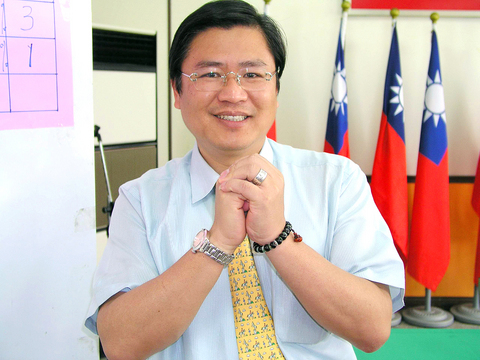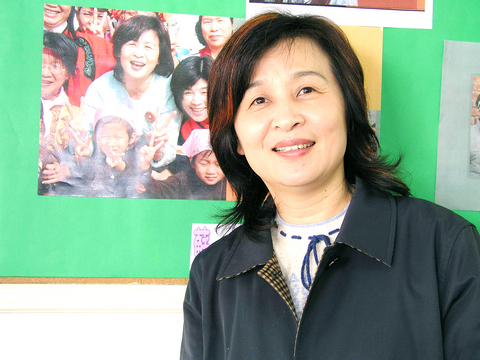The Chinese Nationalist Party's (KMT) five-decade rule of agricultural Yunlin County may come to an end in Saturday's elections. The Democratic Progressive Party (DPP) are determined to win the local-chief elections and their candidate has put forward a number of practical agricultural policies aimed at turning Taiwan's poorest county, a place plagued by a culture of "black gold" and vote-buying, into a bright and prosperous agricultural center.
Abrupt end
The KMT's rule ended abruptly last December, when former county commissioner Chang Jung-wei (張榮味) was arrested on charges of alleged corruption involving a waste-incinerator construction project. Since then, the county's leadership has been in the hands of Li Chin-yung (李進勇), a DPP member who was appointed by the central government to replace Chang.

Saturday's elections will see KMT representative Hsu Shu-po (許舒博), a 43-year-old fourth-term legislator, and the DPP's Su Chih-fen (蘇治芬), a 53-year-old former legislator whose family has a long history in the politics of Yunlin, fight it out for control of the county.
A keenly fought competition is expected on Dec. 3 as several recent polls carried out by different media groups suggest that Su is slightly ahead.
In Yunlin's past, local factions have played a decisive role in many elections. Results of past elections have shown that the support of Chang's faction, disunited since his arrest, will play a key factor in any election victory.

To unite the factions into supporting the KMT, Chairman Ma Ying-jeou (馬英九) has visited Yunlin several times to take part in Hsu's campaign activities. Hsu reportedly said that he has more than 70 percent support from former-commissioner Chang's voter base.
However, the DPP is also busy throwing its weight behind their candidate, Su. President Chen Shui-bian (陳水扁) has visited Yunlin four times this month and has helped to sell Su's policies about turning Yunlin into Taiwan's most competitive agricultural county, or its "Agricultural Capital."
In the 20 townships of Yunlin County, cropland makes up over 68 percent of the total land area. The local farmers' irrigation associations dominate proceedings during elections.
Fallow-fields policy
Since Taiwan joined the WTO in 2002, a compulsory fallow-field policy has been implemented to avoid creating a surplus of fruit and vegetables and to help tackle water shortage problems.
Farmers in more than 10 of the county's townships have been affected. Meanwhile, randomly reported cases of heavy metal pollution in many paddy fields have highlighted the plight of the county's agriculture.
"Yunlin's roots lie in agriculture. An ideal local government would help to technically upgrade it, modernize it and internationalize it," Su said during a press conference two weeks ago.
Wu Ming-ming (吳明敏), a marketing professor at National Chung Hsing University, told the Taipei Times that Su's policies, if implemented well via the local government, might practically improve the lives of the region's poor farmers.
Wu, who is also an agricultural consultant to the Taiwan Thinktank, said, "However, the county will have to pay substantially during the transition. For example, ensuring sufficient selling channels and the safety of agricultural products relies on regulatory reforms."
KMT candidate Hsu's policies rely on the speeding up the development of the Yunlin offshore industrial park. The former KMT-led local government had worked with the central government to carry out projects ensuring water and electricity supplies.
Major investment
Hsu advocates major investment, including a steel mill project from the Formosa Plastics Group, which will require a 600-hectare plot of land. The group has already built one petrochemical complex in the area.
"The development of an offshore industrial park may provide a boost for the local economy, but many of the new job opportunities created would not be for locals," Wu said.

Chinese Nationalist Party (KMT) Chairman Eric Chu (朱立倫), spokeswoman Yang Chih-yu (楊智伃) and Legislator Hsieh Lung-chieh (謝龍介) would be summoned by police for questioning for leading an illegal assembly on Thursday evening last week, Minister of the Interior Liu Shyh-fang (劉世芳) said today. The three KMT officials led an assembly outside the Taipei City Prosecutors’ Office, a restricted area where public assembly is not allowed, protesting the questioning of several KMT staff and searches of KMT headquarters and offices in a recall petition forgery case. Chu, Yang and Hsieh are all suspected of contravening the Assembly and Parade Act (集會遊行法) by holding

PRAISE: Japanese visitor Takashi Kubota said the Taiwanese temple architecture images showcased in the AI Art Gallery were the most impressive displays he saw Taiwan does not have an official pavilion at the World Expo in Osaka, Japan, because of its diplomatic predicament, but the government-backed Tech World pavilion is drawing interest with its unique recreations of works by Taiwanese artists. The pavilion features an artificial intelligence (AI)-based art gallery showcasing works of famous Taiwanese artists from the Japanese colonial period using innovative technologies. Among its main simulated displays are Eastern gouache paintings by Chen Chin (陳進), Lin Yu-shan (林玉山) and Kuo Hsueh-hu (郭雪湖), who were the three young Taiwanese painters selected for the East Asian Painting exhibition in 1927. Gouache is a water-based

Taiwan would welcome the return of Honduras as a diplomatic ally if its next president decides to make such a move, Minister of Foreign Affairs Lin Chia-lung (林佳龍) said yesterday. “Of course, we would welcome Honduras if they want to restore diplomatic ties with Taiwan after their elections,” Lin said at a meeting of the legislature’s Foreign Affairs and National Defense Committee, when asked to comment on statements made by two of the three Honduran presidential candidates during the presidential campaign in the Central American country. Taiwan is paying close attention to the region as a whole in the wake of a

OFF-TARGET: More than 30,000 participants were expected to take part in the Games next month, but only 6,550 foreign and 19,400 Taiwanese athletes have registered Taipei city councilors yesterday blasted the organizers of next month’s World Masters Games over sudden timetable and venue changes, which they said have caused thousands of participants to back out of the international sporting event, among other organizational issues. They also cited visa delays and political interference by China as reasons many foreign athletes are requesting refunds for the event, to be held from May 17 to 30. Jointly organized by the Taipei and New Taipei City governments, the games have been rocked by numerous controversies since preparations began in 2020. Taipei City Councilor Lin Yen-feng (林延鳳) said yesterday that new measures by